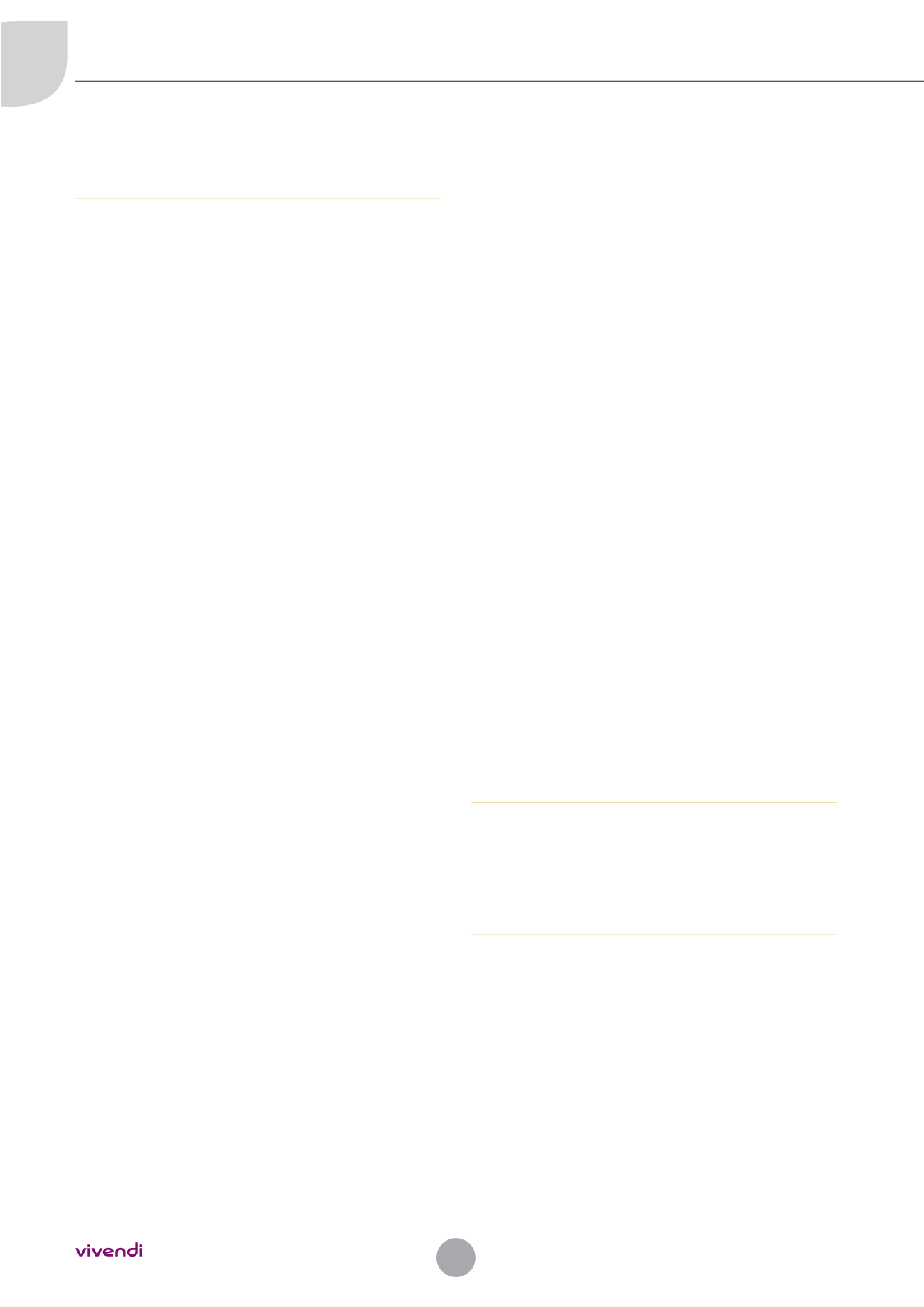

Verification of extra-financial data
Note on Extra-Financial Reporting Methodology
REPORTING SCOPE
The reporting scope was established in accordance with Articles
L.233-1 and L.233-3 of the French Commercial Code and pertains to the
subsidiaries and companies which are controlled, with the exception of
certain companies (see details under each reporting scope).
It should be noted that changes in reporting scope are the result
of acquisitions or disposals between January 1 and December 31
of year N by the consolidated companies:
◆
in the case of a sale during year N, the data for the company is not
accounted for in the scope of year N; and
◆
in the case of the acquisition of a company during year N,
the data from year N will be fully integrated into the reporting for
year N+1, unless the company being added to the scope can gather
its information for year N. A detailed account of the workforce
headcount is however incorporated into the scope of year N.
Scope of Societal Reporting
The scope of societal reporting is linked to the group’s business units,
subject to the following indications:
◆
concerning Canal+ Group, the scope of reporting extends to the
companies located in France, Poland, Africa (focus group of six
countries: Canal+ Burkina Faso, Canal+ Cameroon, Canal+ Congo,
Canal+ Gabon, Canal+ Ivory Coast, Canal+ Senegal) and Vietnam. For
some indicators that specifically apply to the French entity the scope
“Canal+” is then mentioned;
◆
concerning UMG, unless otherwise indicated, the scope of reporting
extends to nine companies which account for 81% of the group’s
revenues (Australia, Brazil, France, Germany, Japan, Netherlands,
South Africa, the United Kingdom and the United States).
◆
concerning Vivendi Village, the scope of reporting extends to Vivendi
Ticketing (Digitick and See Tickets), MyBestPro, Watchever and
L’Olympia.
For the indicators related to responsible purchasing (see Section 4.4),
the data relates to suppliers and subcontractors with which
at least 75% of total expenditure is realized, to facilitate feedback
by the business units.
Scope of Social Reporting
For the “headcount” indicator, the scope of social reporting covers all
group companies and 100% of the work force. In accordance with the
Vivendi Reporting Protocol for Environmental, Social and Societal Data,
companies newly consolidated within the reporting scope during the year
appear only in the tables concerning employees. For 2015, this relates to
(i) Canal+ Benin, Canal+ Haiti, Canal+ Mali, Flab (Flab Presse and Flab
Prod), Studiocanal China, Studio+, Terra Terra Communications Inc.,
Thema, and Vivendi Content for Canal+ Group and (ii) Radionomy and the
Théâtre de l’Œuvre for Vivendi Village and Dailymotion.
The heading “Corporate” refers to the Paris headquarters and the
New York office, and the heading “Headquaters” refers to the Paris
headquarters.
The heading “Vivendi Village” refers to L’Olympia, MyBestPro
(Devispresto, Juritravail and MyBestPro Group), Radionomy (TargetSpot
France, TargetSpot United States, Winamp SA Belgium), the Théâtre
de l’Œuvre, Vivendi Ticketing (Digitick and See Tickets) and Watchever
(France and Germany).
The SECP data is identified separately from the Canal+ Group data.
Scope of Environmental Reporting
The scope of the environmental reporting is as follows:
◆
for Canal+ Group, the reporting scope applies to entities located
in France, Poland, Africa (a focus group of seven countries: Canal+
Burkina Faso, Canal+ Cameroon, Canal+ Congo, Canal+ Ivory Coast,
Canal+ Gabon, Canal+ Senegal, Canal+ Madagascar) and Vietnam.
The SECP data is identified separately from the data of Canal+ Group;
◆
for UMG, the reporting scope covers nine entities representing 81%
of the group’s revenues (Australia, Brazil, France, Germany, Japan,
Netherlands, South Africa, the United Kingdom and the United
States);
◆
Vivendi Village.
The selection of sites which must carry out their own reporting is decided
based on the type of site: e.g., offices, warehouses, technical centers and
data centers, in accordance with the Reporting Protocol for the group’s
companies.
Following the group’s shift in focus towards media and content,
the decision was made to stop monitoring water consumption and
quantities of toxic waste, since these indicators were no longer
relevant following the sale of telecommunications entities. On the other
hand, the monitoring of purchases of plastics and acrylics used in the
manufacturing of products intended for sale was reinforced.
The indicator “Purchases of plastics and acrylics used in the
manufacturing of products put on the market” (see Section 6.3) concerns
only the quantities used for products and equipment placed on the market
for sale. This concerns the DVDs and CDs marketed by UMG and the set-
top boxes for Canal+ Overseas.
REPORTING PERIOD
Reporting of societal, social and environmental data is annual and
concerns the period from January 1 to December 31, 2015.
METHODOLOGICAL DETAILS
AND LIMITS IN RELATION TO INDICATORS
Societal, social and environmental indicators may generally reflect
methodological limits due to the lack of harmonization of international
and national definitions and legislation, or due to the qualitative and
therefore subjective nature of certain data.
Societal Indicators
With regard to the indicators “Breakdown of purchases by main
categories and geographic regions” and “Deployment of responsible
purchasing approach amongst the suppliers and subcontractors”
(see Section 4.4), the subsidiaries reported on tier 1 suppliers and
subcontractors representing at least 75% of the total purchasing amount.
EXTRA-FINANCIAL INDICATORS HANDBOOK
2015
66


















